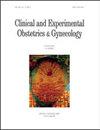Assessing the Potential Causal Relationship between Polycystic Ovary Syndrome and Post-Traumatic Stress Disorder: A Bidirectional Mendelian Randomization Study
IF 0.6
4区 医学
Q4 OBSTETRICS & GYNECOLOGY
引用次数: 0
Abstract
Background: Observational studies have reported that individuals diagnosed with polycystic ovary syndrome (PCOS) face a heightened vulnerability to developing post-traumatic stress disorder (PTSD). However, it is unclear whether this relationship is causal. Consequently, we implemented a bidirectional Mendelian randomization (MR) analysis to examine the empirical causal association of PCOS and PTSD. Methods: We acquired genetic association data for PCOS through a comprehensive meta-analysis from several large-scale genome-wide association studies (GWASs), which enrolled 10,074 cases and 103,164 controls. For PTSD, we obtained data from a GWAS performed by the Psychiatric Genomics Consortium Posttraumatic Stress Disorder (PGC-PTSD) group. The study included a total of 23,212 cases of PTSD and 151,447 controls of European ancestry. For both PCOS and PTSD, we carefully selected genetic instruments that met the rigorous significance threshold (p < 5 × 10-8, r2 < 0.01). To investigate the causal association between PCOS and PTSD, we conducted bidirectional Mendelian randomization (MR) analyses. The primary analysis employed the inverse-variance weighted (IVW) method, complemented by alternative MR approaches such as the maximum-likelihood method, MR-Egger regression, Mendelian randomization-Robust Adjusted Profile Score (MR-RAPS), and MR Pleiotropy RESidual Sum and Outlier (MR-PRESSO) test. Sensitivity analyses were also carried out to verify the robustness of this association. Results: In this study, we identified and utilized 14 genetic variants as instruments for PCOS, while 2 genetic variants were selected as instruments for PTSD. Our findings demonstrated that a genetic predisposition to PCOS was significantly associated with an elevated risk of developing PTSD (odds ratio (OR) = 1.11, 95% confidence interval (CI): 1.03–1.19, p = 7.27 × 10-3 for IVW). MR-Egger regression analysis was performed, and the results did not provide evidence of directional pleiotropy (p intercept = 0.187). Sensitivity analyses utilizing alternative MR methods consistently yielded similar results, supporting the robustness of our findings. Furthermore, in the reverse MR analysis, we observed no significant association between genetic predisposition to PTSD and the risk of developing PCOS (OR = 1.15, 95% CI: 0.69–1.91, p = 0.586 for IVW). Comparable null associations were also observed when alternative MR methods were employed. Conclusions: Through a genetic epidemiological approach, we found that genetic predisposition to PCOS was associated with an increased risk of PTSD, suggesting a potential causal relationship between PCOS and PTSD. Nonetheless, further investigation is necessary to elucidate the underlying mechanism through which PCOS contributes to the development of PTSD.评估多囊卵巢综合征和创伤后应激障碍之间的潜在因果关系:一项双向孟德尔随机研究
背景:观察性研究报道,诊断为多囊卵巢综合征(PCOS)的个体更容易发展为创伤后应激障碍(PTSD)。然而,这种关系是否有因果关系尚不清楚。因此,我们实施了双向孟德尔随机化(MR)分析来检验多囊卵巢综合征和创伤后应激障碍的实证因果关系。方法:通过对几项大规模全基因组关联研究(GWASs)的综合meta分析,获得PCOS的遗传关联数据,这些研究纳入了10074例患者和103164名对照组。对于创伤后应激障碍,我们从精神病学基因组学联盟创伤后应激障碍(PGC-PTSD)组进行的GWAS中获得数据。该研究包括23,212例创伤后应激障碍患者和151,447例欧洲血统的对照组。对于多囊卵巢综合征和创伤后应激障碍,我们仔细选择了符合严格显著性阈值的遗传工具(p <5 × 10-8, r2 <0.01)。为了研究PCOS与PTSD之间的因果关系,我们进行了双向孟德尔随机化(MR)分析。主要分析采用反方差加权(IVW)方法,辅以其他MR方法,如最大似然法、MR- egger回归、孟德尔随机化-稳健调整曲线评分(MR- raps)和MR多效性残差和离群值(MR- presso)检验。还进行了敏感性分析以验证这种关联的稳健性。结果:在本研究中,我们确定并使用了14个遗传变异作为PCOS的工具,选择了2个遗传变异作为PTSD的工具。我们的研究结果表明,多囊卵巢综合征的遗传易感性与发生PTSD的风险升高显著相关(优势比(OR) = 1.11, 95%置信区间(CI): 1.03-1.19, IVW的p = 7.27 × 10-3)。进行MR-Egger回归分析,结果没有提供定向多效性的证据(p截距= 0.187)。利用其他MR方法的敏感性分析一致地产生类似的结果,支持我们研究结果的稳健性。此外,在反向MR分析中,我们观察到PTSD遗传易感性与发生PCOS的风险之间没有显著关联(OR = 1.15, 95% CI: 0.69-1.91, IVW的p = 0.586)。当采用其他MR方法时,也观察到类似的零关联。结论:通过遗传流行病学方法,我们发现多囊卵巢综合征的遗传易感性与PTSD风险增加相关,提示多囊卵巢综合征与PTSD之间存在潜在的因果关系。然而,PCOS导致PTSD发展的潜在机制有待进一步研究。
本文章由计算机程序翻译,如有差异,请以英文原文为准。
求助全文
约1分钟内获得全文
求助全文
来源期刊
CiteScore
0.50
自引率
0.00%
发文量
241
审稿时长
1 months
期刊介绍:
CEOG is an international, peer-reviewed, open access journal. CEOG covers all aspects of Obstetrics and Gynecology, including obstetrics, prenatal diagnosis, maternal-fetal medicine, perinatology, general gynecology, gynecologic oncology, uro-gynecology, reproductive medicine, infertility, reproductive endocrinology, sexual medicine. All submissions of cutting-edge advances of medical research in the area of women''s health worldwide are encouraged.

 求助内容:
求助内容: 应助结果提醒方式:
应助结果提醒方式:


